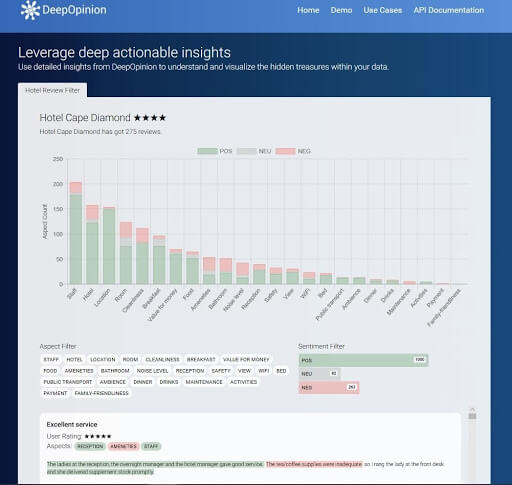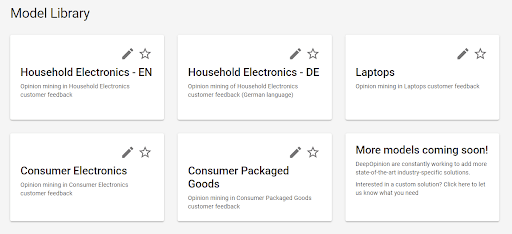What benefits might deeper, actionable, aspect-based sentiment analysis offer for your marketing strategy and planning?
I have recently attended the Social Data Summit, which gathered prominent speakers from leading brands and organizations to discuss the latest developments in digital insights, social listening, and sentiment analysis.
The first speaker Dr. Jillian Nay, a founder of the Social Intelligence Lab, challenged the audience with her presentation “Social Data Intelligence is a Mess! Let’s Fix It”. Jillian highlighted some major challenges facing the social intelligence industry that need to be addressed such as lack of standards, transparency & accountability, insufficient support for social media intelligence roles, limitation of current tools, depreciation of social networks APIs, but also acknowledged exciting progress that industry is making in the area of predictive analytics, different approaches in audience intelligence, cultural intelligence, and advanced brand tracking.
Core Module

Social listening
Part of the Social media marketing Toolkit
Learn what’s involved with social listening including techniques and recommended tools
Learn More
Following on from this discussion, in my view, another area that needs our attention is sentiment analysis. The strategic and business importance of sentiment analysis and urgent need to address its shortcomings to understand customer conversation with greater granularity and accuracy and generate deeper actionable insights have energized interest and research in sentiment analysis. One of the emerging research hotspots in this field is fine-grained Aspect Based Sentiment Analysis (ABSA), which is also referred to as Feature or Attribute Based Sentiment Analysis.
Whereas the more simplistic Polarity Sentiment Analysis – which is focused around sentence-level sentiment analysis, simply classifies the overall sentiment of a sentence into positive, negative, and neutral polarity, Aspect Based Sentiment Analysis (ABSA) allows for more nuanced and contextual meanings.
The business case for ABSA is compelling as it can pinpoints the sentiment polarity on a specific feature or aspect of a specific domain expressed in a sentence, where a feature or aspect represents an attribute or component of an entity, e.g., the screen of a computer, the service for a bank, or the temperature of a hotel room. ABSA wins out as it captures more relevant and detailed insights from the customer discussions by reflecting the aspect or context of the conversations, as well as the domain dependence.
Need a plan to create a winning marketing strategy?
Get started today using a tried and tested step-by-step process to optimize your marketing.
Start Now
Why ABSA Offers a Vision of Next Generation Sentiment Analysis Tools
While widely used polarity sentiment analysis approach has of course its merits and can offer a simplistic view of the most time correct sentiment information, it has a number of shortcomings such as:
- Inability to accurately predict a sentiment, if the sentence does not express explicitly a clear feeling/sentiment or an opinion,
- Inability to identify specific sentiments of a given aspects, features or a component of entities within a sentence,
- Inability to recognize that many sentences can include more than one aspect, each with different polarity. As polarity sentiment analysis uses a single sentiment score per sentence, it is too broad to convey all the sentiments embodied in a sentence and will in many cases imprecisely assign sentiment to the sentence overall.
- Inability to recognize that the aspects within the same domain are semantically close, while aspects from different domains are semantically different (e.g., drink domain vs. computer domain).
- Inability to understand the domain and the context of the domain (e.g., warm tea, warm computer - where the meaning "warm" has a different meaning across different domains such as tea and the computer).
Advanced Module

Learn the latest social media developments
Part of the Social media marketing Toolkit
Learn different options to support your continuous professional development and give your business an edge by keeping up-to-date with social media developments
Learn More
ABSA addresses all of these shortcomings of the Polarity Sentiment Analysis. In essence, ABSA can reflect the domain, context and scene of a conversation by identifying relevant entities, extracting their features/aspects. Crucially to deliver deeper insight into customer conversations, ABSA can determine whether an opinion expressed on each feature/aspect is positive, negative or neutral, offering a more nuanced understanding of multiple sentiment expressed in a single sentence.
Enhancing Sentiment Analysis Using Latest Deep Learning Methods
In order to better understand ABSA analysis and its benefits, we have recently interviewed Stefan Engl, CEO and founder of DeepOpinion in Innsbruck, Austria. DeepOpinion offers a world-leading technology for AI-based text analysis solutions, which surpasses international benchmarks for ABSA. DeepOpinion came to our attention due to its visionary work in text analysis. It is actually the first commercial company to bring the future of text analysis to the market by employing the latest deep learning methods instead of outdated NLP approaches that cannot deal with the context-specific characteristics of language nuance. DeepOpinion consistently outperforms other vendors of 15 to 30% in accuracy - this is the difference between a child and an adult.
We recently met with Stefan to ask him our most pressing questions about the next generation of AI powered ABSA tools and what value deep learning methods can deliver to our customers:
What, in your opinion, are the main advantages for a business when using aspect-based sentiment analysis?
The key advantage of an ABSA is relevancy and precision. The possibility to capture nuances about objects of interest – for example, specific topics, products, brands, people, feature or component of the entities, cannot be done by a simple polarity sentiment analysis.
Secondly, ABSA offers specific detail about the minutiae of customer conversations without the need for time-consuming manual processing. We all know that different features can generate different sentiment responses. When sentiments are broken down into topics, deeper insights are revealed – we can get much clear and immediate indication of exactly what customers are talking about, without reading numerous comments or posts.
Thirdly, since we now know what people are talking about in great detail – the good, the bad and the ugly – business owners can take direct and swift action in terms of business strategy and tactics! For example in the text related to hospitality industry, one can easily pinpoint whether the negative or positive review is related to a specific attributes, i.e., services, hotel staff, hotel room or other customer experience. From this analysis, one can obtain a very clear indication what actions needs to be undertaken.
Our AI text analytics tool can address many use cases such as measuring and analysing perceived quality of products or services across various topics and dimensions, tracking and benchmarking performance KPIs over time and against competitors, conducting advanced churn analysis, prediction & prevention, hate speech detection, discovering important actionable insights and recommendations to teams and departments (Research, Customer Service, HR, Sales, BI, etc.) and much more. There is no excuse for not having the data in highly specific detail!
Finally, as we all know, knowledge is power and so, if one ever needs data to back up one’s decision-making rationale to stakeholders or the management, one can easily bring up individual comments related to the specific aspect.

Deep Opinion Aspect-based Sentiment Analysis (ABSA) Report – Hotel Case Study
Attributes: Staff, Hotel, Location, Room, Cleanliness, Breakfast, Value for Money, Food, Amenities, Bathroom, Noise level, Reception, Safety, View, Wi-Fi, Bed, Public transport, Ambience, Dinner, Drinks, Maintenance, Activities, Payment, Family-Friendliness
Why do you believe that polarity sentiment analysis does not go far enough to generate deep actionable insights? Why should we migrate to ABSA?
Answer: Most social media monitoring tools and social intelligence practitioners still approach sentiment identification simply as a sentence level polarity detection problem. The key problem is that most sentiment analysis algorithms use simple terms to express sentiment about a product or service. However, the reality is more complex than that. Linguistic nuances, sentence complexity, different domains or contexts, all make it challenging to simply reduce long sequence of written text into a simple pro or con sentiment.
For example, when analysing the sentiment in product reviews, one might be interested in not only whether people are talking with a positive, neutral, or negative polarity about specific product, but also which aspects or features of the product they are concerned with.
I can give you a few examples based on the capabilities of our DeepOpinion AI technology that goes beyond the reductive approach to polarity sentiment detection:
| Capabilities |
Example |
| Identify multiple sentiment in one sentence |
“The rooms were beautiful and spacious (positive sentiment), but overpriced (negative sentiment) and too cold (negative sentiment)”. |
| Understand the complex language problems like comparison |
“If you are spending time in Paris, you cannot do better than La Planque Hotel” (positive sentiment). |
| Identify difficult and implicit negations |
“We could hardly find any cold drink” (negative sentiment) or “The hotel room is flawless” (positive sentiment). |
| Identify contextual dependent sentiments, which relates to understanding the context of language |
“A smelly factory is just 2 minutes away from our hotel” (negative sentiment). |
| Understand the domain and the context of the domain |
“A laptop being warm” is negative, while “the coffee being warm” is positive. |
| Understanding of misspellings and loose grammar |
Hotel very sipmle, not modern or old, vrey helpful staff
Hotel very simple, not modern or old, very helpful staff. |
These are just some of the examples that DeepOpinion’s ABSA can address from any text data – from emails, chats, social media posts, customer support tickets, to open text from customer surveys, while many other tools fail to do so. There are also some interesting additional capabilities that our tool can address, such as understanding the slang, automatically identifying hate speech, and much more.
Finally, how businesses and social media practitioners can easily deploy ABSA? Do you offer a DYI Social Media Monitoring (SMM) or Intelligence Tool?
We work in partnership with clients – be they SMM vendors, developers, data scientists, or businesses across all industry sectors to help them acquire the best-in-class technology to solve their complex text analysis cases, including ABSA.
There are a couple of options which we offer. One is a ‘plug and play’ AI models – a Pre-trained Industry Models solution - that can take over complex text analysis tasks and be optimized for a wide range of industries, domains, use cases and languages. We already offer a wide range of pre-trained models covering multiple industries from CPG to insurance, as well as multiple use cases ranging from employee experience to customer services.

A Sample of DeepOpinion’s Ever-Growing Selection of Pre-Trained Industry and Use Case Models
The list of our pre-trained model is ever-growing and if there is a need for more individual, specialized models, we are offering customization.
Our self-service tool, called DeepOpinion Studio can also help users to easily create customized AI solutions, which can tackle complex text analysis tasks within minutes instead of months. By using DeepOpinion Studio, users can easily create customized AI solutions addressing tedious text analysis tasks within 10-30 minutes maximum.
We are also one of the few companies, which provides ABSA for over 50 languages and is not limited to just a few domains. The foundation of our products is our core AI AutoNLU©™ engine, which employs the latest deep-learning methods such as supervised and self- supervised learning to extract metadata from text such as keywords, concepts, topics/aspects, entities, categories, sentiments, intent, and much more.
While supervised learning requires training of AI model on a labelled data set, a self-supervised learning method is a form of unsupervised learning where the data provides the supervision. Our technology requires 100 times less training data, achieves 20 times speed-up in training time, 20 times reduction in compute resources, and 10 times reduction in time for achieving quality analysis.
Technology companies, as well businesses can easily integrate DeepOpinion APIs into their social listening tools to deliver better and more accurate insights to their clients and can be used by anyone regardless of technical proficiency via API.
Luisa Milic is the founder and Director of Ideya Business and Marketing Consultancy Ltd. in Cambridge, UK, launched in October 2004. She is an expert in market analysis, business and strategic planning.



















